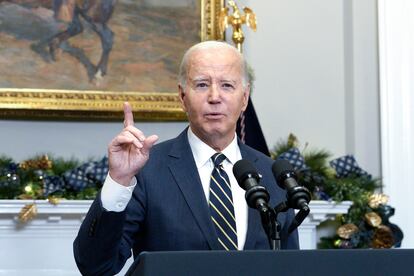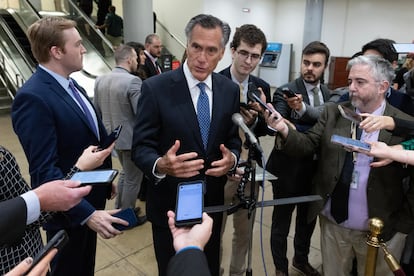US Senate blocks Ukraine aid funds despite Biden’s appeals
Republicans demand tougher border policies with Mexico in exchange for supporting funding to Kyiv


The Republican minority in the Senate on Wednesday blocked the White House’s request for a new aid package for Ukraine in a preliminary vote, despite last-minute appeals by President Joe Biden, who said that the injection of funds “cannot wait.” A total of 49 senators opposed the $105-billion package in aid for Ukraine, Israel, and Taiwan, and to address the situation on the Mexican border. The measure needed the support of 60 senators to move forward, but was only backed by 51.
Republican senators voted against the package because it did not include a tough reform of the immigration system, as they had called for. The package was also rejected by Democrat Senator Bernie Sanders, who opposed the nearly $14 billion in aid earmarked for Israel. The majority leader of the Senate, Democrat Charles Schumer, also ended up voting against it, as a matter of procedure, in order to be able to introduce the motion again in the future.
“This is a serious moment that will have lasting consequences for the 21st century,” said Schumer after the vote, arguing that the result endangers the Western democratic model.
The vote underscores the United States’ growing reluctance to continue providing aid to Ukraine. As the war approaches its second anniversary amid the failure of Kyiv’s counteroffensive, public attention has turned to the war between Israel and Hamas in Gaza.
The Senate’s decision to block aid to Ukraine is not necessarily definitive, but it is a blow to the Democrats and infuses new urgency into the two parties’ ongoing talks to reach an agreement on immigration policy. Those negotiations reached an impasse over the weekend.
Ahead of the vote, Biden implored lawmakers to give the go-ahead for the funding package in a televised appeal from the White House. He argued that blocking the aid package would be giving Russian President Vladimir Putin the “greatest gift” that he could hope for. The president added that If the U.S. does not support Ukraine, it would embolden the Russian leader. “If Putin takes Ukraine, he won’t stop there,” he said, arguing that he could target NATO’s eastern flank to the point where the alliance would be forced to respond.

“Then we’ll have something that we don’t seek and that we don’t have today: American troops fighting Russian troops” on European soil, stressed Biden, who said he is willing to do “significantly more” to strengthen security on the border with Mexico in order to get Republican support for the aid package.
Biden’s speech was part of an intense White House campaign to secure support for the supplemental funding, which includes $61 billion in aid to Ukraine. On Wednesday, the U.S. president held a videoconference with the leaders of G-7 countries to reiterate his government’s support for Kyiv. On Monday, the presidential office warned that the funds available to Ukraine will run out this month and, without new weapons and ammunition, the invaded country risks losing what it has gained in almost two years of fighting. Senior Ukrainian officials visiting Washington, including Defense Minister Rustem Umerov, made the same appeal: if there is no more aid, Ukraine risks losing the war.
To give the go-ahead for the provision of funds, Republicans — including those who support providing aid to Ukraine — demanded that it include measures to tighten U.S. immigration policy. Democrats say they are willing to address immigration reform — an issue on which the two parties have been at loggerheads for decades — but not to concede to the Republicans’ calls for tougher restrictions.
Schumer offered to bring the funding request and a bill to combat fentanyl trafficking to the floor at the same time. The Senate majority leader said he was willing to allow the Republicans to include an amendment on border security to further control arrivals from Mexico.
The seriousness of the dispute became evident on Tuesday: a closed-door briefing in which the White House was to brief senators from both parties on the situation in Ukraine degenerated into a shouting match on the security of the border with Mexico. Ukrainian President Volodymyr Zelenskiy was also scheduled to speak at the session via videoconference, but his participation was cancelled at the last minute for unclear reasons.
Republican House Minority Leader Mitch McConnell, one of the strongest supporters of aid to Ukraine — which he considers essential to protecting U.S. national security — urged members of his party to reject the funding package. “I hope all of our members vote no on the motion to proceed to the shell [bill] to make the point, hopefully for the final time, that we insist on meaningful changes to the border,” he said on Tuesday.
Both parties are trying to keep their voters happy. Republicans are calling for a tougher border policy to address the dramatic rise in irregular immigrants seeking asylum, one of the most important issues for their supporters. With campaigning set to formally begin for the 2024 elections, the party is also responding to the growing unpopularity of the Ukrainian cause among Republican voters. The United States is the main supporter of Ukraine, to which it has provided $67 billion, but Republicans believe that Kyiv has received enough aid. Some critics argue that Ukraine has not been sufficiently accountable for the funding it has received.
Meanwhile, the Democrats, who almost unanimously support providing aid to Ukraine, must perform a delicate balancing act. The progressive wing of the party opposes measures to restrict immigration and is in favor of normalizing the situation of irregular migrants. But at the same time, lawmakers from the party’s moderate wing — who are running for re-election next year in swing or Republican-leaning states — are demanding that initiatives be taken to control illegal immigration, fearing they may lose their seats at the November election.
Sign up for our weekly newsletter to get more English-language news coverage from EL PAÍS USA Edition
Tu suscripción se está usando en otro dispositivo
¿Quieres añadir otro usuario a tu suscripción?
Si continúas leyendo en este dispositivo, no se podrá leer en el otro.
FlechaTu suscripción se está usando en otro dispositivo y solo puedes acceder a EL PAÍS desde un dispositivo a la vez.
Si quieres compartir tu cuenta, cambia tu suscripción a la modalidad Premium, así podrás añadir otro usuario. Cada uno accederá con su propia cuenta de email, lo que os permitirá personalizar vuestra experiencia en EL PAÍS.
¿Tienes una suscripción de empresa? Accede aquí para contratar más cuentas.
En el caso de no saber quién está usando tu cuenta, te recomendamos cambiar tu contraseña aquí.
Si decides continuar compartiendo tu cuenta, este mensaje se mostrará en tu dispositivo y en el de la otra persona que está usando tu cuenta de forma indefinida, afectando a tu experiencia de lectura. Puedes consultar aquí los términos y condiciones de la suscripción digital.








































